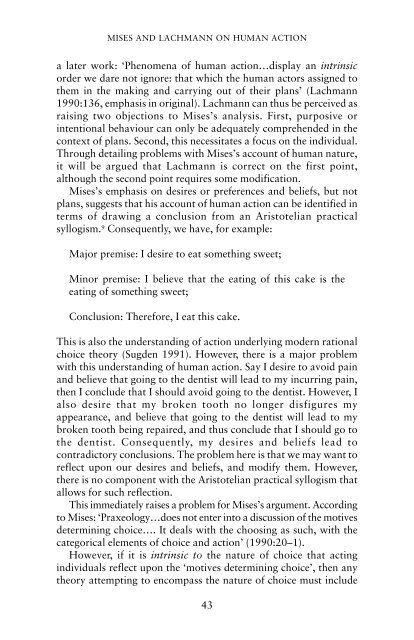Subjectivism and Economic Analysis: Essays in memory of Ludwig ...
Subjectivism and Economic Analysis: Essays in memory of Ludwig ...
Subjectivism and Economic Analysis: Essays in memory of Ludwig ...
Create successful ePaper yourself
Turn your PDF publications into a flip-book with our unique Google optimized e-Paper software.
MISES AND LACHMANN ON HUMAN ACTIONa later work: ‘Phenomena <strong>of</strong> human action…display an <strong>in</strong>tr<strong>in</strong>sicorder we dare not ignore: that which the human actors assigned tothem <strong>in</strong> the mak<strong>in</strong>g <strong>and</strong> carry<strong>in</strong>g out <strong>of</strong> their plans’ (Lachmann1990:136, emphasis <strong>in</strong> orig<strong>in</strong>al). Lachmann can thus be perceived asrais<strong>in</strong>g two objections to Mises’s analysis. First, purposive or<strong>in</strong>tentional behaviour can only be adequately comprehended <strong>in</strong> thecontext <strong>of</strong> plans. Second, this necessitates a focus on the <strong>in</strong>dividual.Through detail<strong>in</strong>g problems with Mises’s account <strong>of</strong> human nature,it will be argued that Lachmann is correct on the first po<strong>in</strong>t,although the second po<strong>in</strong>t requires some modification.Mises’s emphasis on desires or preferences <strong>and</strong> beliefs, but notplans, suggests that his account <strong>of</strong> human action can be identified <strong>in</strong>terms <strong>of</strong> draw<strong>in</strong>g a conclusion from an Aristotelian practicalsyllogism. 9 Consequently, we have, for example:Major premise: I desire to eat someth<strong>in</strong>g sweet;M<strong>in</strong>or premise: I believe that the eat<strong>in</strong>g <strong>of</strong> this cake is theeat<strong>in</strong>g <strong>of</strong> someth<strong>in</strong>g sweet;Conclusion: Therefore, I eat this cake.This is also the underst<strong>and</strong><strong>in</strong>g <strong>of</strong> action underly<strong>in</strong>g modern rationalchoice theory (Sugden 1991). However, there is a major problemwith this underst<strong>and</strong><strong>in</strong>g <strong>of</strong> human action. Say I desire to avoid pa<strong>in</strong><strong>and</strong> believe that go<strong>in</strong>g to the dentist will lead to my <strong>in</strong>curr<strong>in</strong>g pa<strong>in</strong>,then I conclude that I should avoid go<strong>in</strong>g to the dentist. However, Ialso desire that my broken tooth no longer disfigures myappearance, <strong>and</strong> believe that go<strong>in</strong>g to the dentist will lead to mybroken tooth be<strong>in</strong>g repaired, <strong>and</strong> thus conclude that I should go tothe dentist. Consequently, my desires <strong>and</strong> beliefs lead tocontradictory conclusions. The problem here is that we may want toreflect upon our desires <strong>and</strong> beliefs, <strong>and</strong> modify them. However,there is no component with the Aristotelian practical syllogism thatallows for such reflection.This immediately raises a problem for Mises’s argument. Accord<strong>in</strong>gto Mises: ‘Praxeology…does not enter <strong>in</strong>to a discussion <strong>of</strong> the motivesdeterm<strong>in</strong><strong>in</strong>g choice…. It deals with the choos<strong>in</strong>g as such, with thecategorical elements <strong>of</strong> choice <strong>and</strong> action’ (1990:20–1).However, if it is <strong>in</strong>tr<strong>in</strong>sic to the nature <strong>of</strong> choice that act<strong>in</strong>g<strong>in</strong>dividuals reflect upon the ‘motives determ<strong>in</strong><strong>in</strong>g choice’, then anytheory attempt<strong>in</strong>g to encompass the nature <strong>of</strong> choice must <strong>in</strong>clude43

















